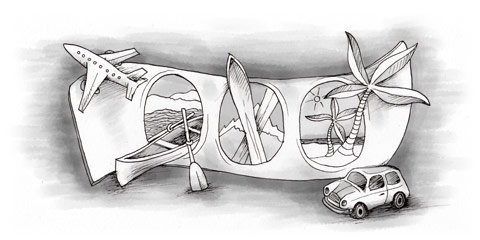But before you pack up your boxes, hand in your resignation and book that one-way Eurostar ticket, there’s a few things you should know about life in France compared to the UK.
It may only be a few short miles away, but from the working week to the average dinner, things are done rather differently over there than back in Britain. Many of these are wonderful, such as better weather and cheaper wine (!), but you may also discover that the endless bureaucracy and different studying style isn’t quite for you.
Read on to discover some of the key things you should know before moving to France, and start planning your French adventure today!
1. No need for a visa
You won’t need a visa! Fortunately for all EU member countries, you can freely travel, work and live in France without going through the hassle of sorting a visa.
2. Scenery of all sorts!
All sorts of scenery, lifestyle and weather can be found in France. With everything from stunning beaches on the Côte d’Azur and windswept islands off the coast of La Rochelle to snowy ski resorts and big, international cities, you’re bound to find your perfect place here.
3. “Faire la bise”
You’ll be expected to ‘faire la bise’, also known as the French greeting, with almost everyone. This can involve two kisses (one on either cheek) in most of the country, and up to four in some pockets of northern France! The best thing to do is watch what the people around you are doing, and follow their lead. In addition, remember to say ‘bonjour’ and ‘bonsoir’ when entering a shop or encountering a neighbour in the hallway - these small acts of politeness are very ingrained in society, and to not do so might be considered rude.
4. Learn French
It’s very hard to succeed without speaking any French. While in big cities like Paris you might encounter some English, even there it will be almost impossible to find a job or make French friends without a word of the language. This is even more difficult in small towns, where very few people will have any grasp of English. Fortunately, there are all sorts of ways to learn, from formal classes and audio-tapes to watching your favourite TV shows dubbed in French!
5. Bothersome bureaucracy
Bureaucracy is more complicated, slower, and involves much more printing than in the UK. No one really enjoys doing admin, and most of us avoid it as much as possible, but to get by in France you’ll need to tackle this head on. Buy a printer, and prepare yourself for signing endless documents for all sorts of different purposes.
6. Sunday is not such a fun day

Many things will be closed on Sunday. Unlike the UK, Sunday is still seen as quite a family-centric day in France - or at least a day for relaxing with loved ones and eating a good meal. Most shops and businesses will be closed, including the supermarket so make sure to do your shopping in advance! You’ll soon come to see Sunday as an essential day of relaxation, and if you do get a spot of cabin fever there’s always the cinema.
7. University is quite a different experience
Studying at university is a different experience in France. Compared to the UK, there isn’t the same culture of heavy drinking, lectures can often start at 8am (or finish at 8pm), and there’s less extra-curricular activities - depending on where you are in France, many students will go home for the weekend. The learning style is also different, with more emphasis on rote learning and larger class sizes. On the upside, it’s also a lot cheaper in France, so you’re likely to leave with little or no debt compared to what you would accumulate in the UK.
8. The French like documentation
You’ll need all the documents you can find. Similar to their approach to bureaucracy, the French like documentation when it comes to processes such as renting an apartment, signing up for university, or opening a bank. For the former, you’ll need to put together a dossier which all the key information you would need at home (and some that you wouldn’t), which will include your payslips, passport, reference letters, birth certificate, job contract, bank details, current information for your guarantor and much more. Get all this together before you leave the UK, and you won’t have to make panicked calls home to find a rogue piece of paper
9. French cuisine is eclectic and exquisite
The food is amazing, unusual, and occasionally downright weird. Everyone knows about the French love for wonderfully soft baguettes, pungent cheeses and incredible pastries, but fewer people are aware of their love for offal, sausages made from pig colon, and jellied calf’s head. Learn some French culinary words and you’ll avoid the worst offenders when you’re out at a restaurant, but it’s worth giving some of them a try too - you never know when you’ll find a new favourite dish you never expected to like!
10. The 35 hour working week
The lifestyle is generally more relaxed. Compared to the work, work, work mentality often found in British cities, the French are more laid-back when it comes to having a good balance between life and work. Lunch breaks are traditionally at least one-two hours long (and involve a three course meal), the working week is technically fixed at 35 hours and sitting on a terrace to enjoy a glass of wine and some charcuterie for ‘apéro’ after work is the norm.


